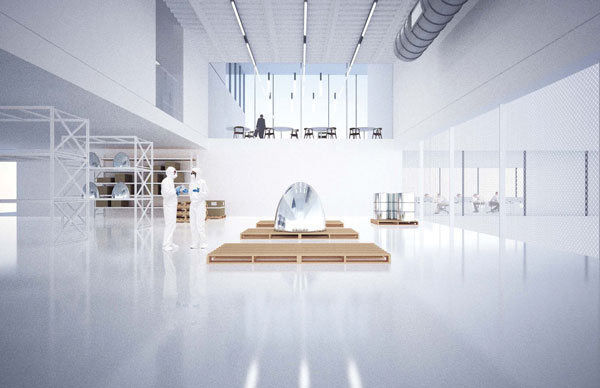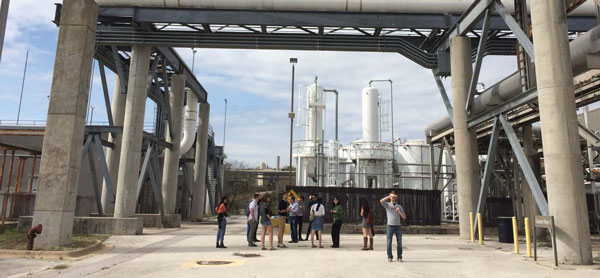Knoll Empowers GSD Students to Envision the Future of the Workplace

Rendering of a laboratory space by Manus Leung MArch ’17 and Lilian Taylor MArch ’17 for the second “Work Environments” studio.
During the 2016–2017 academic year, the Harvard Graduate School of Design concluded a three-part studio series in collaboration with Knoll, Inc., that imagined the future of the “workplace,” or the environments in which people and industries conduct work. Supported by the philanthropic initiative of Knoll and its CEO, Andrew Cogan AB ’84, each of the three spring-semester studios examined a different type of work environment and speculated on its future. In the inaugural Spring 2015 studio, students and faculty examined two interrelated domains of work—the corporate campus and the industry-wide event (such as conferences, exhibitions, and festivals)—and also considered the evolving landscape of work beyond the traditional office environment. The second studio studied a single company, Corning Incorporated, as a template for the future of laboratory and factory workspaces. The final studio, held this past spring, investigated the government’s work environments, with a particular focus on the needs of NASA’s Jet Propulsion Laboratory in Pasadena, California.
The GSD should be at the forefront of the discussion, as the new work configuration affects people’s mental, social, and economic well-being.
Led by the GSD’s Florian Idenburg, associate professor in practice of architecture, with aid from teaching associate Duncan Scovil MArch ’15, the “Work Environments” studios urged students to produce innovative design solutions to accommodate the large-scale technological, economic, and cultural disruptions that are altering traditional workplace structures. “The Harvard GSD understands the relevance of these shifting dynamics and the need for its students to develop knowledge around the subject,” wrote Idenburg in the 2015 studio report Work Environments, documenting the first of the three studios. “The GSD should be at the forefront of the discussion, as the new work configuration affects people’s mental, social, and economic well-being.”
A leader in workplace design for over 75 years, Knoll provided both conceptual and financial support for the studio series. Executive Vice President and Design Director Benjamin Pardo worked with Idenburg on the series at various levels, participating in reviews and other events over the past three years.
“The partnership with Knoll was one of the reasons I was interested in participating in the “Work Environments” studios,” said Abigail Chang MArch ’16, who was a student in the first studio and served as the teaching assistant for the second. “The topics proposed were really large-scale, yet Knoll, as a furniture company, brought the focus to a much smaller, more intimate level. I was curious about how these would come together.”
During the semester, each studio traveled to a location in the United States, as well as around the Boston area, for site visits and meetings with experts. After studying the history and environmental context of the workspaces in question, students were asked to present speculative designs of future work domains based on scenarios devised for each course. The resulting projects range from wildly fantastical to utterly dystopian. Student work from the series is represented in three studio reports, the last of which will be published this fall.
“Studios like those supported by Knoll serve as laboratories for developing imaginative, sustainable solutions to real-world challenges,” said GSD Dean Mohsen Mostafavi, Alexander and Victoria Wiley Professor of Design. “We are deeply grateful to Andrew Cogan for his partnership as we strive to create a better, more humane, and more beautiful world.”

